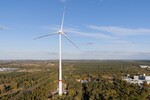Impact of Nantucket Wind Projects on Right Whale Ecosystems Difficult to Distinguish from Effects of Climate Change and Other Influences, Says New Report
Offshore wind projects offer potential for growth in renewable energy production, especially along coastlines, but only two farms exist in the U.S. for observation, and limited research exists about their effect on oceanography and ecosystems. As wind blows across a turbine or wind farm, wind energy is extracted and creates a wind wake behind the turbine. At the same time, the turbine structure in the water column also causes an ocean wake. The increased turbulence and changing local wind velocity due to spinning turbines both affect the structure and movement of the water, referred to as hydrodynamics. Understanding these hydrodynamic effects is essential to develop predictions of the associated potential effects of wind farms on the region’s ecosystem, from phytoplankton to marine mammals.
The committee that wrote the new report was tasked with evaluating the effects of specific wind turbines in the Nantucket Shoals region on marine hydrodynamics and the resulting impacts on marine mammals, and specifically on the North Atlantic right whale’s prey. Due to limited studies available at this time, the committee recommended further observation during all phases of wind energy development (surveying, construction, operation, and decommissioning) to understand the potential impacts that hydrodynamic changes could have on ecosystems and how those impacts could affect the North Atlantic right whale.
“The studies available about the effects and implications of wind farms on local ecosystems are not sufficient to say with absolute certainty whether the turbines would have effects on specific parts of the Nantucket Shoals ecology,” said committee chair Eileen Hofmann, a professor and eminent scholar in the Department of Ocean and Earth Sciences at Old Dominion University. “But with everything we do know at this time, we conclude that those effects are difficult to compare to the impacts of all the other forces changing the hydrology in the region already, especially with the existing and future effects of climate change. Research and monitoring will be essential as these projects move forward in the Nantucket Shoals and other areas around the globe.”
Recommendations for Further Research
In the Nantucket Shoals region, the report recommends that the Bureau of Ocean Energy Management (BOEM), National Oceanic and Atmospheric Administration (NOAA), and others support, and where possible require, oceanographic and ecological modeling and collection of observations through a robust integrated monitoring program before and during all phases of wind energy development. This is especially important as North Atlantic right whale use of the Nantucket Shoals region continues to evolve. This information will help guide critical regional policies that protect North Atlantic right whales and improve predictions of ecological impacts from wind development at other lease sites.
BOEM, NOAA, and others should also support, and require when possible, observational studies during all phases of wind energy development — surveying, construction, operation, and decommissioning — within and in the near vicinity of wind energy areas in other parts of the U.S., the report recommends. These studies should target processes at the relevant scales to isolate, quantify, and characterize the hydrodynamic effects. These agencies should also require model validation studies to determine the capability and appropriateness of a particular model to simulate key baseline hydrodynamic processes relevant at turbine, wind farm, and regional scales. This would improve an overall understanding of the impacts of wind farms on hydrology and would help scientists, policymakers, and engineers make more informed decisions for future offshore projects.
This study was undertaken by the Committee on the Evaluation of Hydrodynamic Modeling and Implications for Offshore Wind Development: Nantucket Shoals and sponsored by the Bureau of Ocean Energy Management.
The National Academies of Sciences, Engineering, and Medicine are private, nonprofit institutions that provide independent, objective analysis and advice to the nation to solve complex problems and inform public policy decisions related to science, engineering, and medicine. They operate under an 1863 congressional charter to the National Academy of Sciences, signed by President Lincoln.
- Source:
- National Academies of Sciences, Engineering, and Medicine
- Author:
- Press Office
- Link:
- www.nationalacademies.org/...
- Keywords:
- report, National Academies, climate change, North Atlantic right whale, influence, Nantucket, wind farm, offshore, impact























